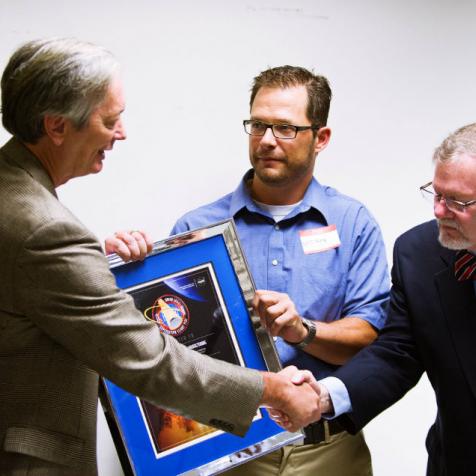
Company Details
Location
Golden, Colorado
Founded
2006
Ownership Type
Private
Products
Aerospace Components
Golden, Colorado
Founded: 2006
A division of NFT, Inc.
After founder Gary Vaillancourt merged with nuclear-focused NFT, his operation made more than 1,000 parts for NASA's Orion spacecraft.
Vaillancourt started in manufacturing young. "I started sweeping floors in a machine shop when I was 16 in Buffalo," he remembers.
He worked for that shop, Enhanced Tool, for 12 years and consulted on the side on projects for aerospace and other industries. "I had a knack for programming difficult multiaxis stuff," Vaillancourt says.
He bought his first CNC machine on eBay in 2004, moved west from New York to Colorado in 2005, started Paradigm in 2006, and has been on the cutting edge of aerospace ever since.

The company's initial 3-axis work led to 4-axis and 5-axis projects. Now working on NFT's four 5-axis CNC machines, Vaillancourt touts that one such unit can outperform three of its 3-axis counterparts.
They're not only notably more efficient (thanks to fewer setups), they're notably more expensive, and if they go down, he adds, "It's not a quick fix" -- most manufacturers of 5-axis machines are German. For this reason, many manufacturers have shied away from investing in the technology.
But Vaillancourt is a big booster of it. "My doors have always been open, even to my competitors. The more people who use 5-axis, service will be better, the cost of the machines will come down, and there'll be more people with those skills."
The 5-axis focus got the company in the door with prime contractor Lockheed Martin on NASA's Orion spacecraft project, which the agency dubs "a critical part" of its plan for a manned mission to Mars. After Paradigm won the contract to provide structural spars, Lockheed liked what they saw and placed orders for more parts -- more than 1,000 in all.
"We ended up machining 5,000 pounds of titanium," says Vaillancourt. About 10 percent of that total made it onto the Orion Exploration Flight Flight 1 (EFT-1) craft that lifted off from Cape Canaveral, Florida, last December, he adds, on a rocket from United Launch Alliance. "We were one of the only subcontractors who had parts in every subsystem in that vehicle."
Top officials took notice: NASA recently recognized Paradigm with an "Orion Program Manager's Commendation Award" for its work on the project. Vaillancourt anticipates making plenty more parts for the next Orion launch, the EFT-2, tentatively slated for 2018. "Pending continued funding and congressional support, we should be working on it for the next three to four years," he says. "Denver's becoming the center of the Orion project."

In between, Paradigm primarily serves customers in aerospace and defense. "We're doing business with some of the top tier aerospace companies that are critical to nearly every rocket launch and satellite launch that happens," says Vaillancourt, noting that he takes on projects from several other industries in need of complex components.
That kind of diversity is important in the often all-or-nothing aerospace business. After the recession hit, financing was hard to come by, even when Vaillancourt had a purchase order in hand. "To get a $30,000 line of credit was like pulling teeth," he says.
To ease the crunch, he struck a deal with his nuclear-focused neighbor. Paradigm had been working on projects with NFT since moving into a space next door in 2007. "We had a lot of things in common," he says. "The acquisition by NFT has given me a lot of resources to pull from."
Vaillancourt has since transferred his 5-axis knowledge to NFT and trained numerous technicians to program and operate the machines. He says he looks for people with 3-axis experience. "Once they've got that base, it takes six months to two years to add that capability to their résumé."
And Vaillancourt is regularly the one helping employees improve their skill set. "I'm vice president but I get my hands dirty in the shop," he laughs.
Challenges: "The [5-axis] machine tools and the software is expensive," says Vaillancourt. And the nearest service centers are in L.A. and Chicago. "Because we don't have a strong manufacturing base like other places, we struggle a little bit with service and support."
Opportunities: Growth in new commercial spaceflight projects. "It's hard to get into legacy programs that have been around for a long time," Vaillancourt explains. "It's very hard to switch suppliers on complicated parts. It's almost a no-no."

Colorado represents another big opportunity for Paradigm. "It's almost the Silicon Valley of aerospace," he says. A decade ago when he first relocated to the Rockies, Vaillancourt says he was "working from FedEx boxes, but in the last three to four years, there's been a lot of work in Colorado. Every good shop is just slammed." He estimates that more than half of Paradigm's work is in-state.
Needs: Workforce. "We can buy machines all day long, but really the limiting factor is qualified people and finding people who are interested in learning."
In Buffalo in the 1990s, he adds, a help wanted ad would attract five or 10 good candidates, but "here in Colorado, we struggle."
